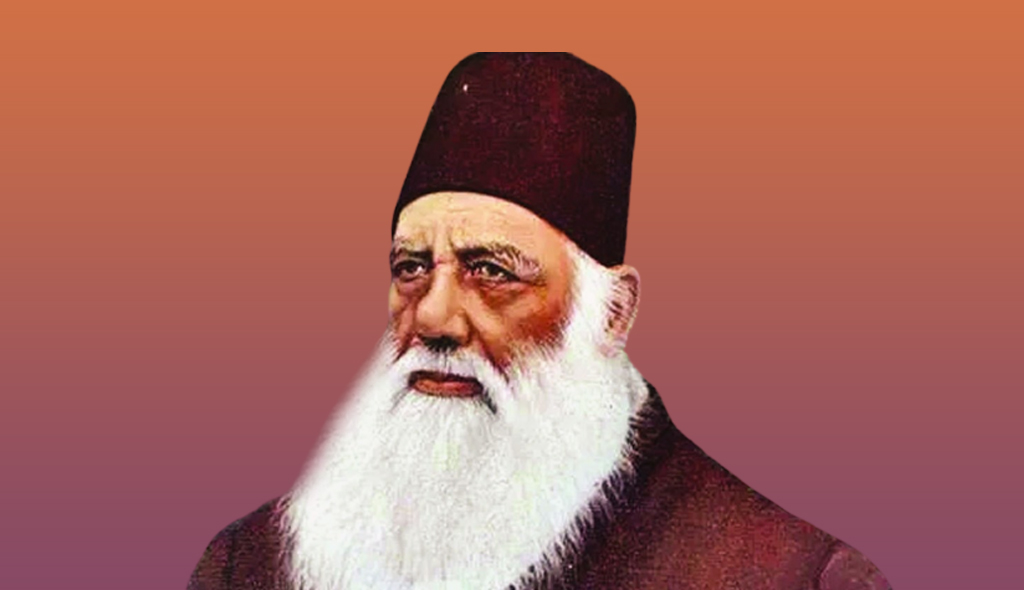Syed Ahmad Khan Taqvi was born in 17, 1217, in Delhi, which was the capital of the Mughal empire in the running times of Mughal emperor Akbar ll . Syed’s father, Syed Mutaqi Muhammad bin Hadi Khan, was close to Emperor Akbar Shah and served as his personal advisor. Sir Syed Ahmad Khan was a teacher and politician.He was a philosopher as well.He was also a social reformer.
Syed Ahmad Khan’s family raised him in a large house in a wealthy area of the city, adhering strictly to Mughal Noble traditions and exposing him to politics.
Sir Syed was trained in Persian, Arabic, Urdu, and orthodox religious subjects.
Early life:
Their mother, Aziz-un-Nisa, played a formative role in Sir Syed’s early life. raising him with a strong emphasis on modern education. Syed was struggling to read and understand the Quran.
Syed Ahmad Khan took charge as the editor of his Brothers’ journal and declined employment offers from the Mughal court. Instead, he chose to join the service of the East India Company.
In 1840, he was promoted to the title of munshi. In 1858, he was appointed to a high-ranking post at the court in Muhamadabad.
Educational Reforms:
He installed Persian Madarasah in 1964 in Muradabad.
Victoria School came into existence in Ghazipur in 1964, offering a curriculum that included English, Urdu, Persian, and Arabic languages. The same year saw the establishment of a scientific society in Ghazipur, dedicated to translating numerous books into Urdu. In 1864, this society found its new home in Aligarh.
He was set up at Muhamadan Anglo-Oriental College by Lord Lytton in 1877. It was initially started as a school in 1875.
Career:
Having recognized the steady decline in Mughal political power, Sir Syed decided to enter the service of the East India Company. He could not enter the colonial civil service because it was only in 1860 that Indians were admit. His first appointment was as a serestadar (lit. clerk) of the criminal department in the Sadr Amins office in Delhi, responsible for record-keeping.
Political Reformer:
remove the misconception of Britishers by writing about loyal Muhammadans of Indians and the causes of revolt in India. To develop new relations between Birtishians and Muslims, Sir Syed wrote the Tehzibul Akhlaq commentary on the Bible. He gave strong reasons against Dr. Hunter’s book that Muslims are ready to work with Brits.
Social Reformer:
Conservative Muslims always disliked Sir Syed Ahmad Khan because he understood that modern socialization was the only solution to the social crises faced by Muslims.
In this regard, Anjuman-e-Taraki-e-Urdu was established by him to ensure that Muslim children were given shelter and basic necessities, preventing them from being influenced by Christian missionaries.
He wrote another magazine, “Aahkam-e-taam-e-Ahle-kitab,” in which he discussed the Islamic principles of etiquette for drinking and dining.
Books written by Sir Syed Ahmad Khan include:
- “A” thar-as-sanadid (Great Monuments) documenting the antiquities of Delhi
- “Jila-ul-Qulub bi zikr-il mahbub”
- “Tuhfa-i-Hasan”
- “Tahsi fi Jar-i-Saqil”
- “Namiqa dar bayan masala tasawwur-i-shaikh”
- “Silsil-ul-Mulk”
- “Tabyin-ul-Kalam”
Quotes:
- “Life is a journey, not a destination.”
- Focus on what truly matters; don’t waste life on petty things.
- We are all part of a larger society, and it is our duty to contribute to the betterment of the world around us.”
- No matter where you come from or what your background is, you can always make a difference in the world.”
- We have to open our hearts and minds to the outside world.”
- There is no harm in being proud of our country and its achievements, but we should not be arrogant or think that we are better than others.
- We should learn from the experiences of other countries and try to improve upon them.
- Education is the best legacy that a parent can leave for his child.”
- It is only through education that one can learn to distinguish between right and wrong and discover the true purpose of life.
Two national theories:
The two national theories, also known as the ideology of Pakistan, were the basis for the partition of India in 1947. Sir Syed was the man who first demanded the separate electorate for Muslims in the speech of math on January 16, 1888. He also advised Muslims to keep away from the Indian national congress. Because I thought that INC was not in favor of Muslims. because through this way of governance,Muslims will always remain minorities.
Reformer:
On April 1, 1869, he went along with his son Syed Mahmood to England, where he was award the Order of the Star of India. By 1873, the committee under Sir Syed issued a proposal for the construction of a college in Aligarh. He began publishing the journal Tahzib-u-l-Akhlaq Social Reformer on December 24, 1870, to spread awareness and knowledge on modern subjects and promote reformers in Muslim society. Sir Syed established a modern school in Aligarh and,obtaining support from the wealthy and British, laid the foundation stone of the Muhammadanglo-Oriental College in May 875. He retired from his career as a jurist the following year, concentrating entirely on developing the college and on religion reform.
Last Year:
An avowed loyalist of the British Empire.
Lord Dufferin nominated him as a member of the Civil Service Commission in 1887.
Sir Syed Ahmad Khan Bahadur lived the last two decades of his life in Aligarh, regarded widely as the mentor of 19th and 20th century Muslims. Despite illness and old age, Sir Syed died on March 27, 1898.
They buried him beside Sir Syed Masjid inside the campus of Aligarh Muslim University.


